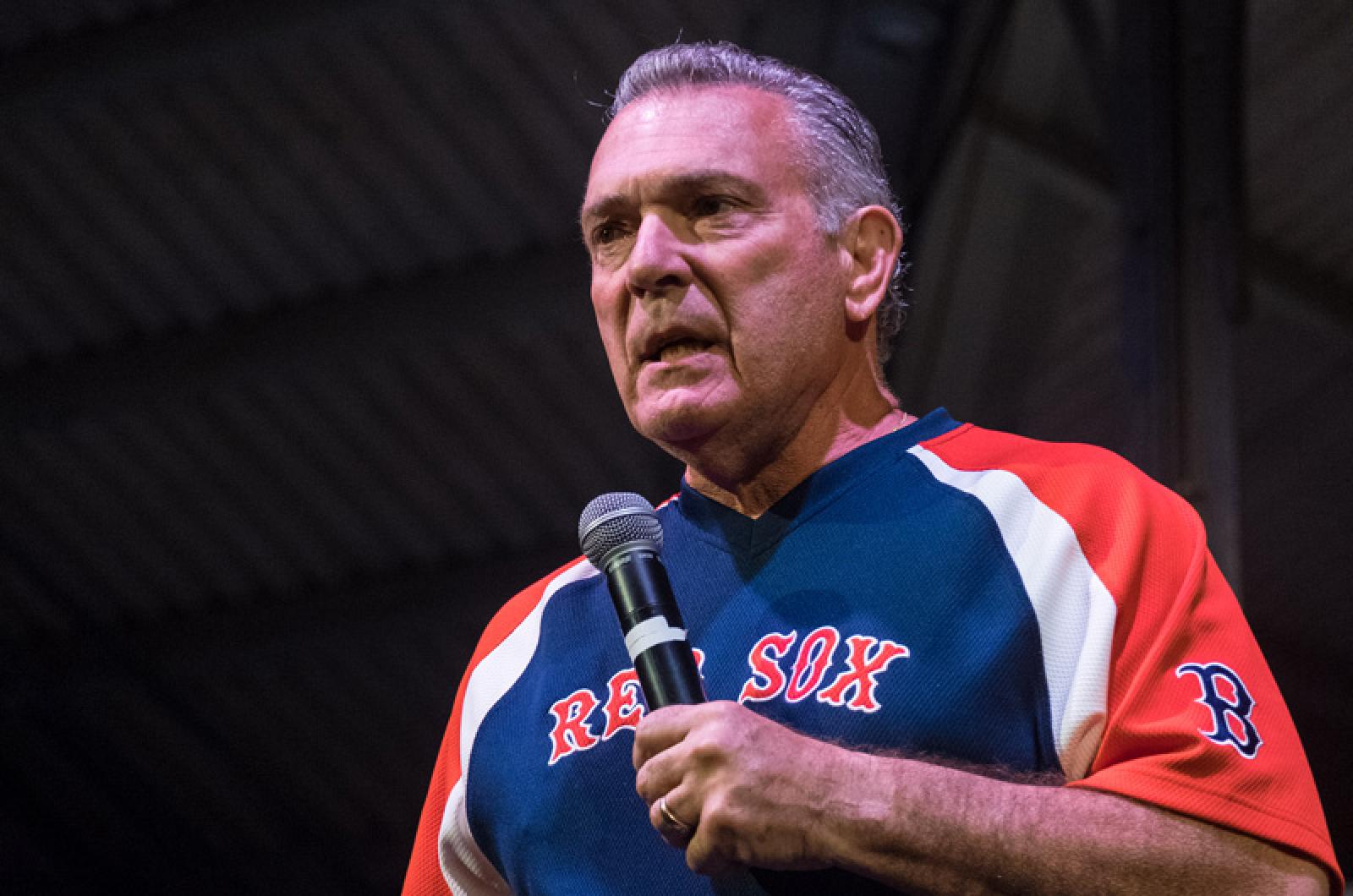What should have been a career highlight for hall of famer and former Boston Red Sox player Bernie Carbo — a game-tying home run for the Red Sox during the 1975 World Series — was a hollow victory.
“For 28 years in my life, I never missed a day of doing drugs. I played every game high,” Mr. Carbo said to a rapt audience at the Tabernacle on Monday.
The Martha’s Vineyard Camp Meeting Association invited Mr. Carbo to the Island to speak as part of their mission to advance spiritual growth and community outreach. Executive director of the organization, CJ Rivard began the evening by introducing Christine Todd, who in June established an Island chapter of Learn to Cope, a support group for family members of those with addictions.
“When one segment of our community is struggling or hurting, it affects all of us,” Ms. Rivard said. “And we have an epidemic on Martha’s Vineyard.”
Ms. Todd had the honor of introducing Mr. Carbo. She told the crowd that she hoped the event would facilitate discussion and help to reduce stigma around addiction. “On the Island, I know of four overdose-related deaths this year alone,” Ms. Todd said.
Mr. Carbo then took the stage and offered a frank recollection of his history with substance abuse. The former major league ballplayer was first drafted by the Cincinnati Reds in 1965 at age 17. He said he was thrown into a world for which he was entirely unprepared.
“I was just a baby, really,” he said. “Next thing I knew, I was going out with the team about every night.”
He started drinking and quickly developed a habit. He recounted an incident that occurred when he was 19, eating breakfast at a restaurant in Virginia. “The waitress there in the restaurant, she said, ‘You know Bernie, I think you’re an alcoholic.’”
After a promising start in the big leagues, things took a quick turn for the worse. Mr. Carbo said he got tired. He was given various pharmaceuticals: dexedrine, benzedrine, pain pills and sleeping pills. And he was drinking. Eventually he began using marijuana and cocaine.
“With everything that was going on with the drugs and whatever, I was just circling and circling straight down.”
His baseball career came to an end at the age of 33 because of his addictions. Mr. Carbo was even contemplating suicide when he got a call from Red Sox teammate Bill Lee, who helped Mr. Carbo into a rehabilitation program.
Unwilling to admit he had a problem, Mr. Carbo prepared to leave soon after he checked in, requesting his car keys from the front desk.
When they refused his request, he had an anxiety attack that landed him in Tampa University Hospital for further medical examination. While there he had a chance encounter with his hospital roommate, which Mr. Carbo credits as the reason why he is alive and sober today. His roommate was a Baptist preacher who helped Mr. Carbo become a born-again Christian.
“I cannot overcome the drugs, the world, the pain... I cannot do it by myself, there is no way I can do it by myself. You have to have something more than yourself,” Mr. Carbo advised the audience.
Seasonal resident Denise Wall attended the event because of an interest in the topic and her work with an off-Island group that addresses addiction and substance abuse. She said that Mr. Carbo’s talk helped her realize how speakers can aid in outreach to young adults.
She agreed with Mr. Carbo’s message on how religion can help those in recovery, but felt more needed to be discussed about the hereditary nature of addiction. “It’s very interesting, he mentioned his father was an alcoholic, his grandfather was an alcoholic, his daughter, substance abuse, and his granddaughter... our community needs to support those who have substance abuse and addictions, because I think it’s more of a disease, they’re finding it’s more of a brain disease.”
Proceeds from the event benefited Learn to Cope and Martha’s Vineyard Community Services. Mary Korba, communications manager for community services, said she found Mr. Carbo a passionate speaker with an important message. She said his story might prevent others from going down a similar path and offer guidance to those who are currently struggling.
“I feel that there’s hope,” Ms. Korba said. “I hope everyone that is here, heard what they needed to hear.”




Comments
Comment policy »